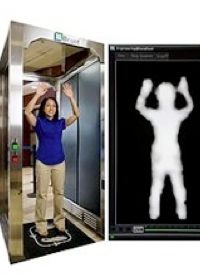
The U.S. House of Representatives is in the process of cutting off new funding for the Transportation Security Administration’s naked-body scanners, which have been the subject of intense controversy virtually since their inception. The Blaze reports:
Draft legislation released Thursday by the Appropriations homeland security subcommittee denies the Obama administration’s $76 million request for an additional 275 of the scanners, which many travelers dislike because TSA employees can view full body images of travelers.
The measure will have no impact on the 500 naked-body scanners already in use at 78 airports nationwide, nor will it affect the 500 that have recently been funded in a spending bill.
The TSA contends that privacy concerns are currently being addressed with a new computer software program that will allegedly produce less revealing images. The Blaze explains:
The agency is trying out new software that would have the machines read the images and alert airport screeners when there’s a potential weapon or other threat. The screener would then see the location of the threat as shown on a stick figure of the body.
The new software is pending approval, and until it shows more consistent results, panel chairman Robert Aderholt (R-Ala.) is refusing to disburse any further resources. “We don’t want to skimp on security but we want to make sure that where we can make short cuts, we do,” he commented.
The TSA continues to defend the use of the machines, asserting that they have detected 210 prohibited, illegal, or dangers items at checkpoints nationwide.
Likewise, the agency continues to assert that passengers have a choice between the enhanced pat-down in private and the naked-body scanners.
According to Congressman Aderholt, the purpose of the measure is budgetary and not driven by protests from privacy advocates.
Critics of the naked-body scanners are delighted by the House measure. Representative Jason Chaffetz, a longtime opponent of the machines, said of the scanners, “They’re a nuisance. They’re slow. And they’re ineffective. The bottom line is that … they’re just not as effective as a good ol’ German shepherd.”
Last year, Chaffetz led a 310-118 vote on the House floor to cut off funding for the machines, but the White House and the Senate did not support the measure.
Advocates of the machines contend that without them, passengers will be subject to the more intrusive enhanced pat-downs. Recently, the pat-downs have been the subject of even more controversy as video footage of a baby undergoing the enhanced pat-down went viral, as well as footage of a 6-year-old noticeably upset after being patted down at the New Orleans airport. Proponents of the scanners point to these scenarios to bolster their claims that people would prefer the machines.
Peter Kant, executive vice president of Rapiscan Systems, one of the companies which makes the naked-body scanners, states:
Now [the TSA] will have to hand search more people. More hand search means a lot more expense than using the technology. Ninety-five plus percent of people would rather be scanned than go through a pat down.
Some lawmakers believe that Americans should not have to undergo either option. Congressman Ron Paul (R-Texas) asserts that a number of Americans are “ … sick and tired of an out-of-control TSA poking, prodding, and violating us.”
A CBS News poll from last year showed that 81 percent of respondents supported the full-body scanners, which have already cost the federal government $1 billion.
However, as noted by bodyscannertruth.com, the CBS poll was flawed for a number of reasons:
• They asked a random sampling of Americans, not American flyers, not
American frequent fliers; and
• They did not follow up with questions regarding the likeliness of approval if the subject knew that the machines were potentially harmful, that graphic images were being stored, that they violated child pornography laws, that security experts believe they are ineffective and wasteful, that travelers may be subjected to sexual molestation even after using the machines, or that pilots and flight attendants recommend not using them.
Regardless of public opinion, however, the financial investment for the naked-body scanners, as well as the powerful support of individuals such as Mississippi Senator Thad Cochran, a top Republican on the Senate Appropriations Committee, ensures that the machines will likely not be going away any time soon.
Chaffetz sarcastically notes, “The whole body-imaging machines have something that (bomb-sniffing) dogs don’t have. Lobbyists.”




